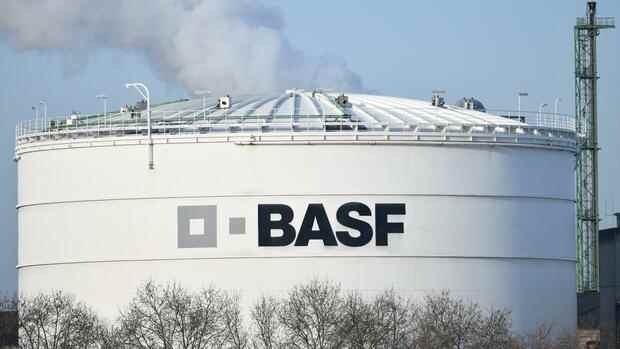Frankfurt The chemical group BASF more than doubled its operating profit in 2021 and increased its dividend by ten cents to EUR 3.40 per share. Despite a good start, the group expects losses for the current year. According to forecasts by the chemical giant, further increases in energy costs are likely to reduce operating profit by up to 20 percent in 2022. In view of these forecasts, the BASF share started trading on Friday morning with price losses of almost two percent.
Last year, the BASF Group was able to increase its sales by a third to 78.6 billion euros, mainly thanks to a significant recovery in the plastics and basic chemicals sector. The operating result (EBIT) adjusted for special items improved from 3.6 to almost 7.8 billion euros.
The bottom line was a net profit of 5.5 billion euros, compared to a loss of one billion euros in the previous year, which was caused, among other things, by value adjustments on various areas. At EUR 3.7 billion, free cash flow also improved significantly compared to the previous year’s figure of EUR 2.3 billion.
Above all, rising energy costs have already prevented an even stronger increase in profits in 2021. BASF estimates the additional costs for the European sites due to increased natural gas prices in 2021 at around 1.5 billion euros. Of this, 800 million euros were attributable to the fourth quarter alone. The savings that the Group has achieved over the past three years through extensive efficiency measures have been largely offset by higher energy prices.
Top jobs of the day
Find the best jobs now and
be notified by email.
“We started the year very strongly and in January 2022 achieved good figures above those of the same month last year,” explained BASF CEO Martin Brudermüller. The order books in the industry are high. Therefore, global industrial production is expected to grow by 3.8 percent.
>> Read about this: How Europe is bracing itself against rising energy prices with billions in relief
The BASF boss announced “further significant price increases” for the coming months. The aim is to improve the margins in the downstream businesses again. The main focus here is on the extensive business with highly refined chemical products, such as intermediate products for the food and cosmetics industries.
BASF’s sales and profits are likely to suffer
Despite the planned price increases and strong demand, the group still expects sales and earnings to fall for the year as a whole. Based on previous assumptions, sales of 74 billion euros and 77 billion euros and EBIT before special items of between 6.6 and 7.2 billion euros are expected for 2022. BASF expects a return of between 11.4 and 12.6 percent, compared to 13.5 percent in the previous year.
All in all, both the operating profit for the past year and the forecast for 2022 are slightly below the analysts’ expectations. So far, you have assumed adjusted EBIT of 7.9 billion euros in 2021 and more than 7.1 billion euros in the current year. However, chemical expert Markus Mayer from Baader Helvea rates the group’s outlook as rather conservative. In his view, the decline in margins in the plastics sector in particular should be less than assumed.
In its outlook, the chemical company refers primarily to uncertainties that could result from supply chain disruptions, the corona pandemic and the development of energy prices. The war in Ukraine, on the other hand, is not mentioned among the risks for business development.
However, in the financial statements for 2021, the group made further write-downs of 581 million euros on its 67 percent stake in the Wintershall Dea Group, which is relatively heavily involved in Russia.
>> Read about this: Business deals with Russia put European energy companies under pressure
Despite a significantly higher operating profit, the oil and gas producer burdened the BASF Group’s investment result with a loss of 344 million euros. All in all, the Wintershall stake is now just under 9.6 billion euros in BASF’s books. BASF had already written off more than 900 million euros on Wintershall in 2020.
BASF intends to divest itself of the stake as part of an IPO. In view of the war in Ukraine, however, the conditions for this appear to be extremely unfavorable. In addition, the partner Mikhail Friedman, whose holding company Letter One holds the remaining 33 percent of Wintershall Dea, recently spoke out against an IPO.
In the chemicals business, the Ludwigshafen-based group benefited from significantly recovered margins in the business with basic chemicals and plastics. In the Chemicals division, which includes basic chemical products, operating profit for the year as a whole has increased more than sixfold to just under three billion euros. The plastics division tripled its earnings to 2.4 billion euros. In contrast, the agrochemicals division (crop protection products and seeds) and the Nutrition & Care division (preliminary products for food, cosmetics and cleaning agents) posted losses of more than a quarter each.
More: Wintershall Dea expects compensation if Nord Stream 2 shuts down
